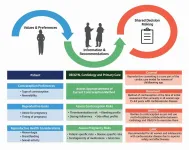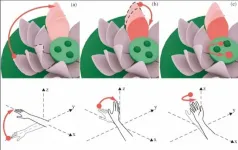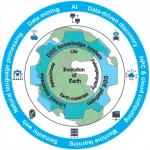(Press-News.org) EAST LANSING, Mich. - Nine of the hottest years in human history have occurred in the past decade. Without a major shift in this climate trajectory, the future of life on Earth is in question, which poses a new question: Should humans, whose fossil fueled society is driving climate change, use technology to put the brakes on global warming?
Michigan State University community ecologist Phoebe Zarnetske is co-lead of the Climate Intervention Biology Working Group, a team of internationally recognized experts in climate science and ecology that is bringing science to bear on the question and consequences of geoengineering a cooler Earth.
The group's paper, "Potential ecological impacts of climate intervention by reflecting sunlight to cool Earth," was published in the most recent issue of Proceedings of the National Academy of Sciences of the United States, or PNAS.
"There is a dearth of knowledge about the effects of climate intervention on ecology," said Zarnetske, associate professor in the Department of Integrative Biology in the MSU College of Natural Science and the paper's lead author. "As scientists, we need to understand and predict the positive and negative effects it could have on the natural world, identify key knowledge gaps and begin to predict what impacts it may have on terrestrial, marine and freshwater species and ecosystems if it were adopted in the future."
Conversations in 2018 between Jessica Gurevitch, Distinguished Professor in the Department of Ecology and Evolution at Stony Brook University and working group co-lead, and Alan Robock, Distinguished Professor in the Department of Environmental Sciences at Rutgers University, gave rise to the pioneering group, which is more aware than most that geoengineering Earth's atmosphere is more than just a science fiction scenario.
The costs and technology needed to reflect the sun's heat back into space are currently more attainable than other climate intervention ideas like absorbing carbon dioxide from the air. The working group anticipates its discussions and open access paper will encourage an explosion of scientific investigation into how a climate intervention strategy known as solar radiation modification, or SRM, in tandem with greenhouse gas emissions reduction, would affect the natural world.
The feasibility of planetary wide SRM efforts hinge on accurate predictions of its myriad outcomes provided by the well-established computer simulations of the Geoengineering Model Intercomparison Project, or GeoMIP. The PNAS paper lays the foundation for expanding GeoMIP's scope to include the incredible range and diversity of Earth's ecosystems.
"While climate models have become quite advanced in predicting climate outcomes of various geoengineering scenarios, we have very little understanding of what the possible risks of these scenarios might be for species and natural systems," Gurevitch said. "Are the risks for extinction, species community change and the need for organisms to migrate to survive under SRM greater than those of climate change, or does SRM reduce the risks caused by climate change?"
"Most of the GeoMIP models only simulate abiotic variables, but what about all of the living things that are affected by climate and rely on energy from the sun?" Zarnetske said, who is also a faculty member of MSU's Ecology, Evolution and Behavior Program. "We need to better understand the possible impacts of SRM on everything from soil microorganisms to monarch butterfly migrations to marine systems."
Zarnetske's Spatial and Community Ecology Lab, or SpaCE Lab, specializes in predicting how ecological communities respond to climate change across scales from the microcosm to the global, making it uniquely poised to assist the working group in illuminating vital data for future SRM scenarios such as stratospheric aerosol intervention, or SAI, the focus of the paper.
SAI would reduce some of the sun's incoming radiation by reflecting sunlight back into space, such as what happens after large volcanic eruptions. Theoretically, it would be possible to continuously replenish the cloud and control its thickness and location to achieve a desired target temperature.
But the paper reveals the under researched complexity of cascading relationships between ecosystem function and climate under different SAI scenarios. In fact, the scientists argue that climate change mitigation must continue regardless of whether SRM is adopted, and the question remains whether some or any SRM can be beneficial in addition to decarbonization efforts.
"Although SAI may cool Earth's surface to a global temperature target, the cooling may be unevenly distributed, affecting many ecosystem functions and biodiversity," Zarnetske said. "Rainfall and surface ultraviolet radiation would change, and SAI would increase acid rain and would not mitigate ocean acidification."
In other words, SRM is not a magic bullet for solving climate change. Until the working group's efforts inspire new research into the effects of different climate intervention scenarios, SRM is more akin to a shot in the dark.
"Participating in this working group has been quite eye-opening for me," said Peter Groffman, ecosystem ecologist and professor at the Advanced Science Research Center at the CUNY Graduate Center and the Cary Institute of Ecosystem Studies. "I was unaware that modeling climate intervention was so advanced, and I think that climate modelers were unaware of the complexities of the ecological systems being affected. It is a strong reminder of the importance of the need for multidisciplinary analysis of complex problems in environmental science."
"We hope that this paper will spark a lot more attention to this issue and greater cooperation between scientists in the fields of climate science and ecology," Gurevitch said.
INFORMATION:
The Climate Intervention Biology Working Group, which is funded by the National Science Foundation, is hosting sessions at two scientific conferences in 2021: "Biosphere Responses to Geoengineering" at the American Association for the Advancement of Science, or AAAS, Annual Meeting, and the Ecological Society of America's 106th Annual Meeting in August.
BOSTON - Addiction is associated with social exclusion, loss of access to resources, and general disengagement from civic life. Now, a study recently published in the journal Psychology of Addictive Behaviors and led by David Eddie, PhD, of the Massachusetts General Hospital's Recovery Research Institute has found that the majority of Americans who have resolved an alcohol or other drug problem report achievements related to self-improvement, family engagement, and civic and economic participation since resolving their addiction. Additionally, it appears these achievements accumulate with time in addiction recovery.
Incorporating data from the Recovery Research Institute's landmark 2017 National Recovery Study, which indicated ...
A new study by Stanford University biologists finds an explanation for the idea that physical characteristics such as skin pigmentation are "only skin deep." Using genetic modeling, the team has found that when two populations with distinct traits combine over generations, traits of individuals within the resulting "admixed" population come to reveal very little about individuals' ancestry. Their findings were published March 27 in a special edition of the American Journal of Physical Anthropology on race and racism.
"When two founding groups first come together, a visible physical trait that differed between those founders initially carries information about the genetic ancestry of admixed individuals," says Jaehee Kim, a postdoctoral research fellow in biology at Stanford and first author ...
In the fight against cancers, activating mutations in the RAS family of genes stand in the way of finding viable treatment options. Now, scientists at the University of Missouri and Yale University have discovered that one of these mutations -- oncogenic RAS or RASV12 -- is also responsible for the regrowth of cancer cells following genotoxic therapy treatment, or drugs that cause damage to a cancer cell's DNA in order to eliminate it from the body.
"Most of our knowledge of how cells respond to DNA damage is mainly derived from studies looking at the single cell level," said Yves Chabu, an assistant professor in the MU College of Arts and Science. "Therefore, we don't know much about how tumor cells respond to DNA damage in the broader ...
URBANA, Ill. ¬- If your day started with a cup of coffee, there's a good chance your morning brew came from Colombia. Home to some of the finest Arabica beans, the country is the world's third largest coffee producer. Climate change poses new challenges to coffee production in Colombia, as it does to agricultural production anywhere in the world, but a new University of Illinois study shows effects vary widely depending on where the coffee beans grow.
"Colombia is a large country with a very distinct geography. The Andes Mountains cross the country from its southwest to northeast corner. Colombian coffee is currently growing in areas with different altitude levels, and climate impacts will likely be very different for low ...
Pregnancy can increase the risk of morbidity and mortality in women with cardiovascular disease; however, many cardiologists are not having pre-pregnancy contraception discussions with their patients of child-bearing age. There is a need to provide evidence-based guidance for contraceptive safety and effectiveness and pregnancy planning options for this high-risk patient group, according to a paper published in the Journal of the American College of Cardiology (JACC). This paper is one of a five-part JACC focus seminar series addressing a wide range of topics in the emerging cardio-obstetrics field.
Prior research has found that 68% of females have had sex at least once by the time they were 17, ...
A recent study proposed a three-dimensional LotusMenu that can "bloom in the palm". With this menu, even if you are not Nezha, you can also control your own lotus.
The research paper is titled: "LotusMenu: A 3D Menu using Wrist and Elbow Rotation Inspired by Chinese Traditional Symbol". It's published in SCIENCE CHINA Information Sciences recently, written by Associate Professor Lu Fei's human-computer interaction research team from Beijing University of Posts and Telecommunications. Based on the metaphor of the traditional lotus pattern, the researchers ...
The Bureau of Reclamation today released final technical reports supporting the Water Reliability in the West - 2021 SECURE Water Act Report. Reclamation's 2021 West-Wide Climate and Hydrology Assessment and seven individual basin reports provide detailed information on climate change impacts and adaptation strategies to increase water supply reliability in the West. A new 2021 SECURE Report Web Portal is also available to provide a user-friendly, web-based format for delivery of information in the reports.
"Western water supply and delivery systems are affected by changing hydrologic conditions and competing demands," Deputy Commissioner Camille Calimlim Touton said. "These reports highlight Reclamation's effort to use ...
Humans have long explored three big scientific questions: evolution of the universe, evolution of Earth, and evolution of life. Geoscientists have embraced the mission of elucidating the evolution of Earth and life, which are preserved in the information-rich but incomplete geological record that spans more than 4.5 billion years of Earth history. Delving into Earth's deep-time history helps geoscientists decipher mechanisms and rates of Earth's evolution, unravel the rates and mechanisms of climate change, locate natural resources, and envision the future of Earth.
Two common approaches, deductive reasoning ...
Researchers from North Carolina State University have developed an exosome-coated stent with a "smart-release" trigger that could both prevent reopened blood vessels from narrowing and deliver regenerative stem cell-derived therapy to blood-starved, or ischemic, tissue.
Angioplasty - a procedure that opens blocked arteries - often involves placing a metal stent to reinforce arterial walls and prevent them from collapsing once the blockage is removed. However, the stent's placement usually causes some injury to the blood vessel wall, which stimulates smooth muscle cells to proliferate and migrate to the site in an attempt to repair the injury. The result is restenosis: a re-narrowing of the blood vessel previously opened by angioplasty.
"The ...
ITHACA, N.Y. - The cost of harvesting solar energy has dropped so much in recent years that it's giving traditional energy sources a run for their money. However, the challenges of energy storage - which require the capacity to bank an intermittent and seasonally variable supply of solar energy - have kept the technology from being economically competitive.
Cornell University researchers led by Lynden Archer, Dean and Professor of Engineering, have been exploring the use of low-cost materials to create rechargeable batteries that will make energy storage more ...





